Penland Paper Program
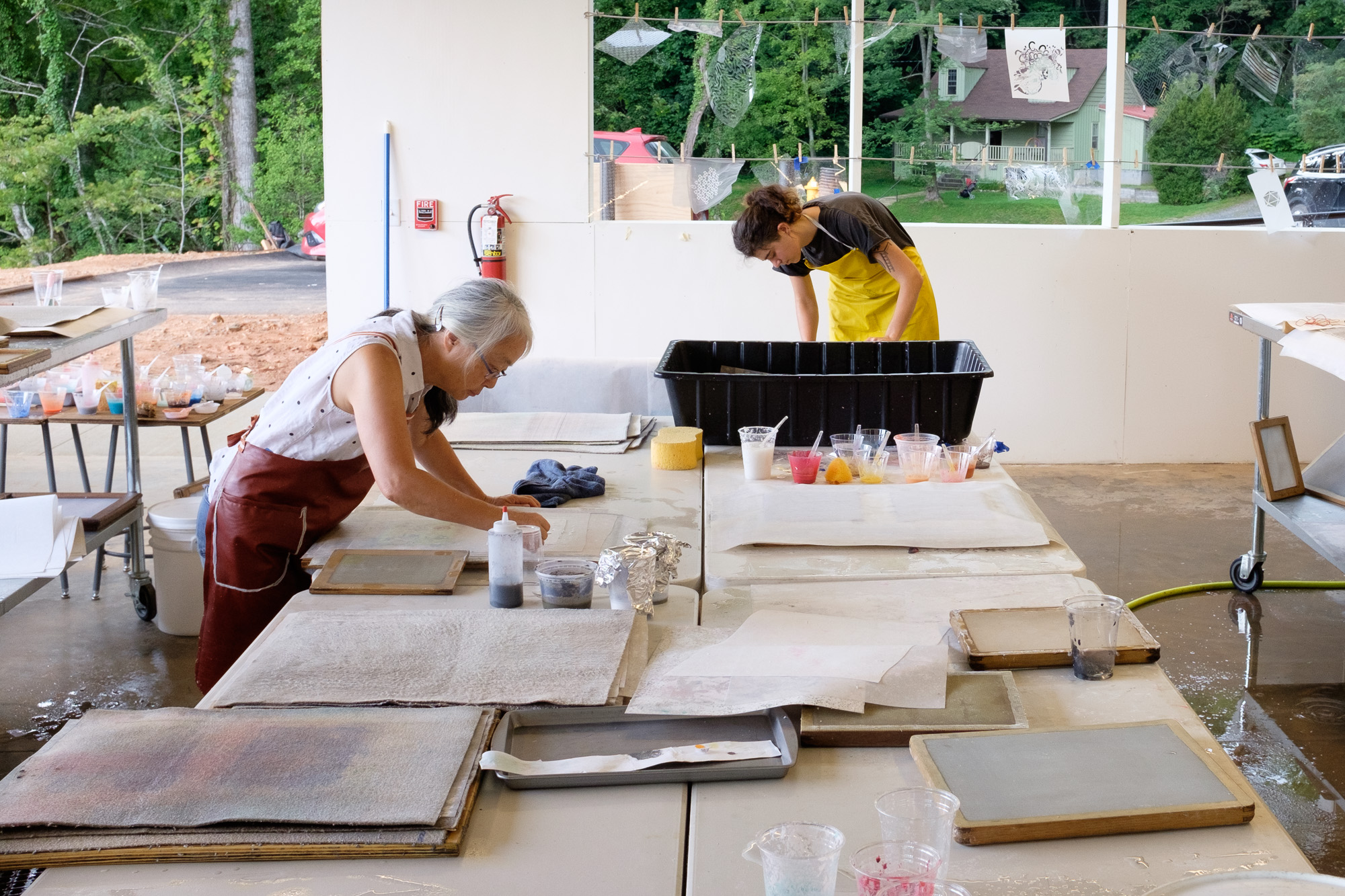
The Penland paper program offers beginning to advanced workshops in traditional and contemporary methods. The studio provides space and specialty equipment for the exploration of concept and technique in paper. The scope of each workshop is determined by the instructor with input from our program director and support from our programming staff. Our versatile facility and high caliber artist/educators allow us to provide relevant programming in topics from eastern and western papermaking to mixed media installation and everything in between. We strive for a balance of technical and aesthetic content and value all cultural and historical perspectives. We offer workshops that inspire and challenge students from curious beginners to accomplished professionals. Our programming is current in spirit and respectful of craft traditions.
The paper studio is very flexible, but is particularly well equipped for sheet forming (including Eastern and Western traditions), pulp painting, three-dimensional casting, armatures and moldmaking, sculpture and installation, papercutting, and dying and decoration techniques. The range of workshop topics includes but is not limited to production sheet forming, Korean paper techniques (jisueng and joomchi), sculpting with handmade paper, plant harvesting and natural dying, Japanese decorative paper techniques, contemporary watermarks, collage and perforation, and folded and kinetic paper sculpture. Materials and techniques are combined in a myriad of ways, and instructors often ground technical exploration with conversations about historic and/or current context, design, or idea generation. Recent instructors include Mary Hark, Frank Brannon, Lee Emma Running, Cynthia Thompson, Paul Wong, Akemi Martin, Aimee Lee, Jo Stealey, Matthew Shlian, Lynn Sures, Georgia Deal, Yukari Hayashida, Amy Jacobs, Ann Marie Kennedy, and Leigh Suggs, among many others.
Our workshops take place in a well-equipped, well-maintained, and safe studio designed to accommodate diverse content and working styles. There are work tables for each student, a drying room, a beater room, and covered outdoor work and meeting spaces.
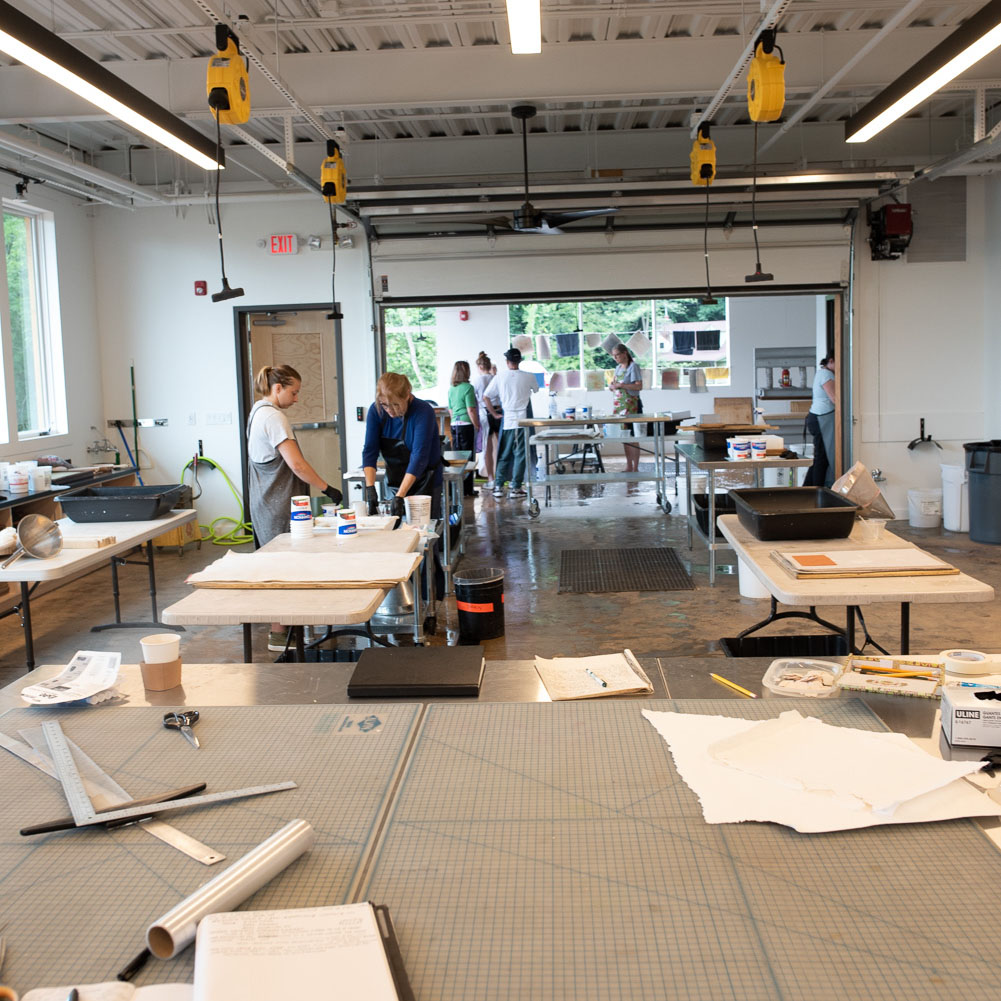
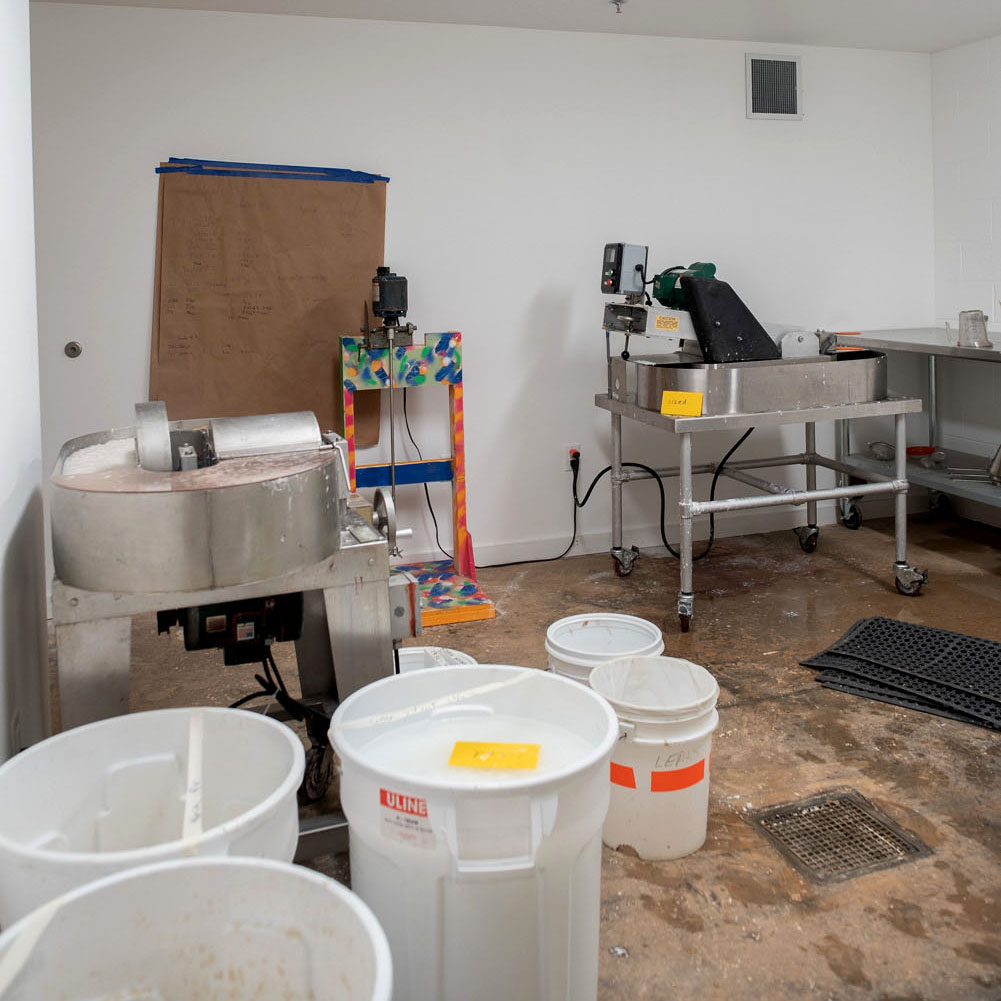
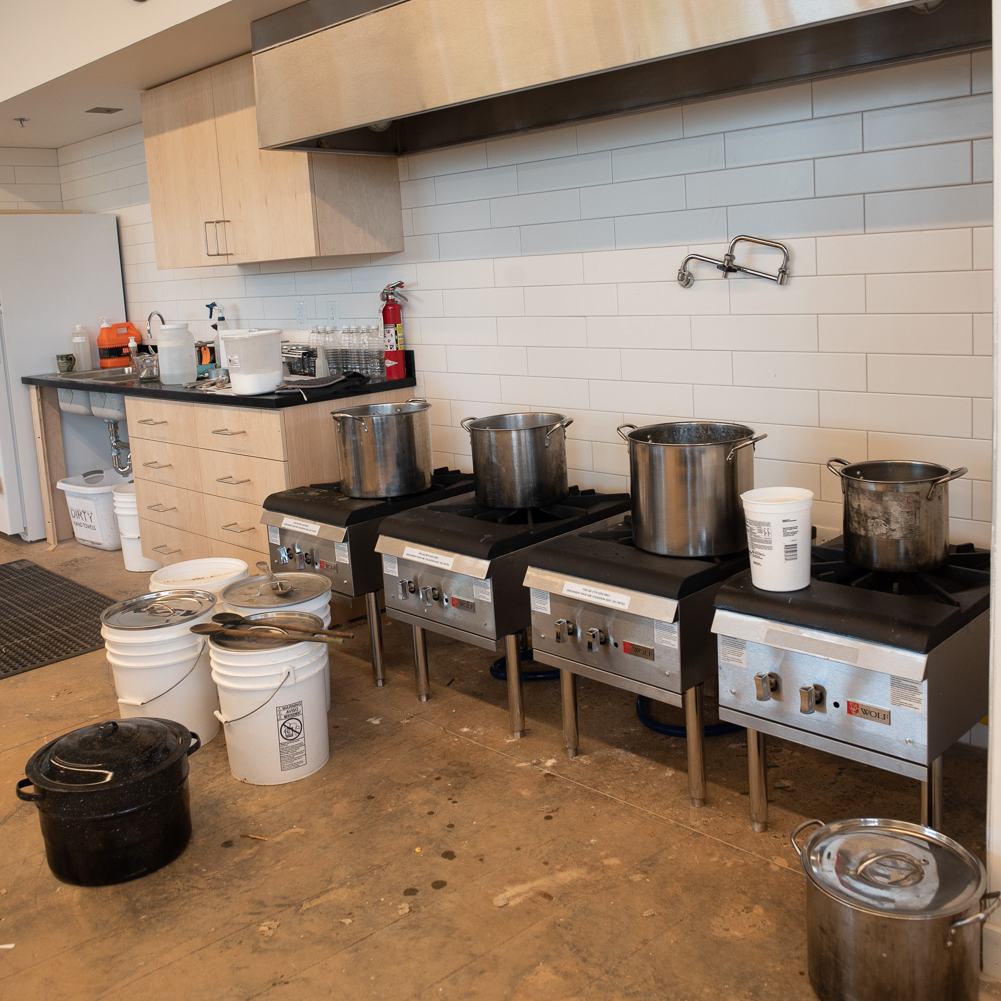
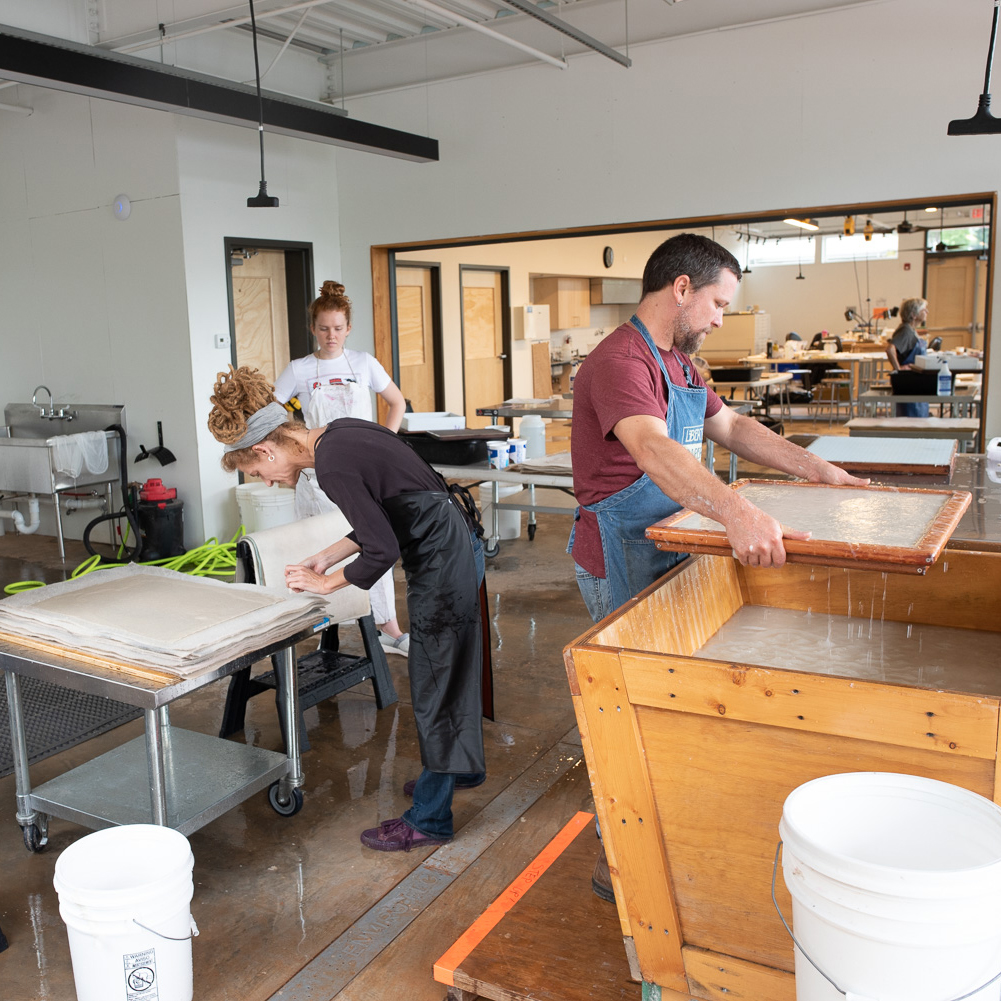
The Studio
Equipment
The paper studio is equipped with the following:
Four gas burners
Three 2-lb Reina hollander beaters
2-lb Lee Scott McDonald Hydra hollander beater
4 x 6 ft Reina stainless steel vacuum table
Wiz Mixer
Moulds and deckles ranging from 5.5 x 8.5″ to 32 x 42″
30” x 30” Deckle box
24” x 30” Deckle box
2 Restraint stack dryers with corresponding blotters and triwall corrugated cardboards—one can dry sheets up to 36 x 48 inches, the other up to 24 x 32 inches
Papermaking vats
Felts/pellons
David Reina 50-ton electric hydraulic press with 36 x 40 inch platen and rolling cart
Howard Clark 20-ton hydraulic press with 26 x 32 inch platen
Aardvark 12-ton hydraulic press with 16 x 23 inch platen
Wooden and plastic press boards to fit all sizes of our presses
Aluminum press boards
Stainless steel pots in a variety of sizes
Pulp sprayer
Air compressor
Beating mallets
Drying brushes
Sugetas ranging in size from 10 x 12 inches to 18 x 24 inches
two refrigerators
hand tools
couching tables
This list of equipment is intended to give you an idea of what the studio is like. It is a general description of equipment and may change before your session. The equipment used by your class will be determined by your instructor and will be appropriate to the techniques covered in your class. Students are welcome to bring favorite personal hand tools for use in the studio.
Supplies and Materials
Supplies for the paper studio are available for resale in the studio. This includes raw fiber, linter, pigments, retention agent, sizing, and formation aid, as well as materials needed for specific classes. An additional studio fee will be assessed for supplies used by the entire class or for demos. You will be notified in advance, on the student materials list, if a studio fee greater than $50 is expected. During concentration, shared supplies are not included in tuition, therefore each class will be assessed a studio fee based on all shared materials usage. You are responsible for bringing personal supplies needed for individual work.
Please refer to your instructor’s material list for specifics about materials needed for the class. In order to reduce waste, paper towels are NOT provided, so please plan to bring 3-4 cotton towels for your personal use. If you feel the need to use paper towels, please bring enough rolls for the duration of your session.
Toolkits
Toolkits are NOT provided in papermaking. Please refer to your instructor’s material list for specifics about personal tools needed for the class.
Classroom
The paper studio is located on the ground floor of the new Northlight complex. It was completed in 2018 with significant design input from Penland paper instructors. The space includes individual work tables, a dry work area, a wet work area, a separate beater room, temperature- and humidity-controlled rooms for drying paper and storing fibers and other materials, and a semi-enclosed outdoor workspace. The maximum class size is 12 students.
Student Workspace
Students work at individual wood tables with melamine tops. Padded stools with backs are provided for all, and furniture is on casters to make it easy to move and reconfigure as needed.
Storage
Each student is provided with flat file space in addition to access to lockable storage cabinets located in a dry portion of the studio.
Safety Information
A first-aid kit and two fire extinguishers are located in the studio, as well as an eyewash station and a safety shower. There is a mandatory safety walk-through at the beginning of every class. The walk-through is to introduce you to the studio space and to show you the safety equipment. North Carolina Health regulations do not permit Penland to provide safety equipment for shared use; therefore, items such as dust masks, respirators, gloves, and aprons are sold in the supply store. You may prefer to bring your own from home. Please refer to your instructor’s material list for specifics about safety equipment needed for the class. Flameproof cans are provided to collect hazardous waste such as rags used with mineral spirits or other solvents. Alcohol is not permitted in the studios. Working in the studios under the influence of alcohol is not permitted. The use of illegal drugs at Penland is prohibited.
The school maintains a comprehensive hazardous waste program and asks that you limit the materials you bring to campus to those classified as non-toxic. The material must be in its original packaging. An environmental fee will be assessed for classes generating hazardous waste. In order to limit the hazardous waste generated in the studios, we cannot allow students to bring toxic materials outside of the class supply list into studios.
Shared Studio Equipment
Shared space/music: Each class should discuss the playing of music and reach a consensus on the time of day, the volume, and the type of music to be played. Tolerance and consideration are expected from everyone.
If you wish to use equipment in other studios on campus during your session, you must work with the instructor, studio assistant, or coordinator of that studio to arrange access. They will determine if the desired usage is compatible with their class’s activities and if you are able to work safely and independently with the equipment.
Session Schedules
Each session starts with an all-school meeting Sunday evening at 5pm followed by dinner in the Pines. Classes start Sunday at 8:30pm. Classes end and studio clean-up takes place the day before your session ends. The last day of each session is reserved for farewells and an all-school exhibition of work created during your time at Penland.
Everyone must participate in studio clean-up; if you must leave early, please ask the studio assistant to assign you clean-up tasks you can accomplish before your departure.
If you have questions about the paper studio, contact:
Studio Coordinator: Beth LaCour
Voicemail: 828-592-4004
E-mail Address: books-paper@penland.org


